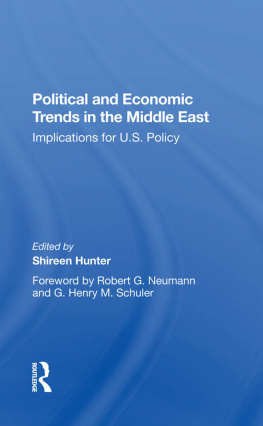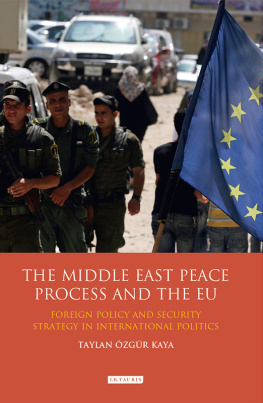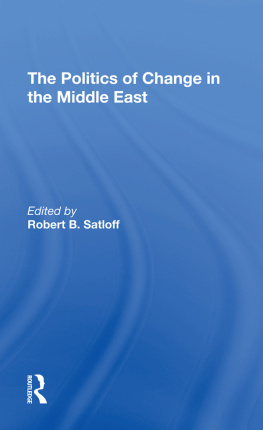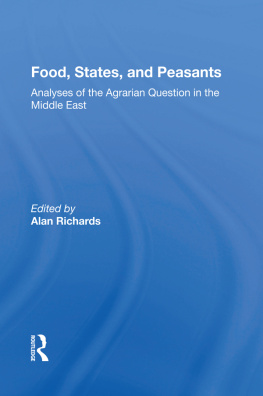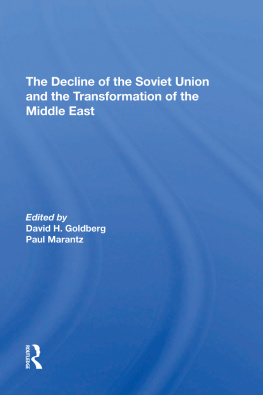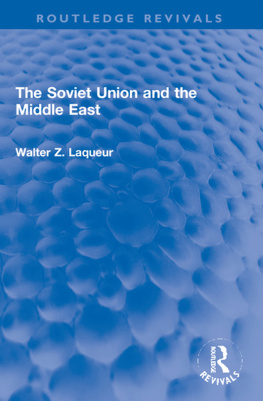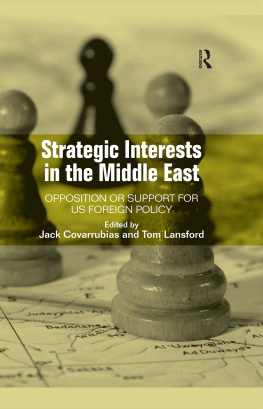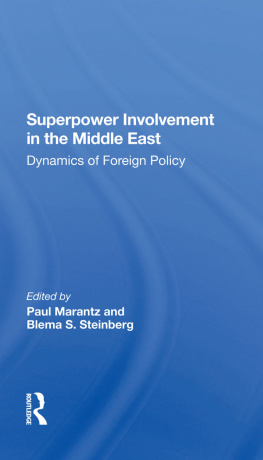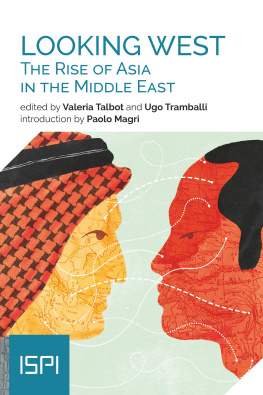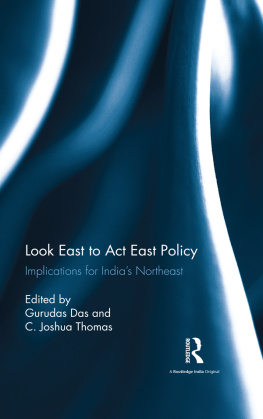Political and Economic Trends in the Middle East
Other Titles Published in Cooperation with The Center for Strategic and International Studies Georgetown University
NATO: The Next Generation, edited by Robert E. Hunter
National Security and Strategic Minerals: An Analysis of U.S. Dependence on Foreign Sources of Cobalt, Barry M. Blechman
International Security Yearbook, 1984/85, edited by Barry M. Blechman and Edward N. Luttwak
Bioenergy and Economic Development: Planning for Biomass Energy Programs in the Third World, William Ramsay
The Cuban Revolution: 25 Years Later, Hugh S. Thomas, Georges A. Fauriol, and Juan Carlos Weiss
The U.S. and the World Economy: Policy Alternatives for New Realities, edited by John Yochelson, with a foreword by William Brock
The Emerging Pacific Community: A Regional Perspective, edited by Robert L. Downen and Bruce Dickson
Modern Weapons and Third World Powers, Rodney W. Jones and Steven A. Hildreth
Under Pressure: U.S. Industry and the Challenges of Structural Adjustment, edited by Catherine Stirling and John Yochelson
Forecasting U.S. Electricity Demand: Trends and Methodologies, edited by Adela Maria Bolet
About the Book and Editor
This book explores the rapid changes in the economics and politics of the Middle East, which profoundly influence U.S. policy and interests in the region. The contributors examine elements in the economic picture, including falling oil prices and the uncertainty surrounding OPEC; the concomitant drop in oil revenues and its effect on the spending patterns and business climate of the oil-producing countries in the Gulf; and the emergence of new trade issues (such as the export of refined petroleum products to the U.S.) and their implications for U.S. industries. They also analyze the political impact of shifting regional alignments (such as the Egyptian-Jordanian and Jordanian-PLO rapprochement), Syria's ascendancy, and the formation of a coalition government in Israel. Examining the direction of the current situation in detail, the contributors explore potential future trends and the implications for U.S. strategy in the Middle East.
Shireen Hunter is deputy director of the CSIS (Center for Strategic and International Studies) Middle East project. She formerly served as an Iranian diplomat in London, Geneva, and New York. Her books include OPEC and the Third World: The Politics of Aid (1984).
PUBLISHED IN COOPERATION WITH THE CENTER FOR STRATEGIC AND INTERNATIONAL STUDIES GEORGETOWN UNIVERSITY
Political and Economic Trends in the Middle East
Implications for U.S. Policy
edited by Shireen Hunter
Foreword by Robert G. Neumann and G. Henry M. Schuler
First published 1985 by Westview Press, Inc.
Published 2019 by Routledge
52 Vanderbilt Avenue, New York, NY 10017
2 Park Square, Milton Park, Abingdon, Oxon OX14 4RN
Routledge is an imprint of the Taylor & Francis Group, an informa business
Copyright 1985 by The Center for Strategic and International Studies
All rights reserved. No part of this book may be reprinted or reproduced or utilised in any form or by any electronic, mechanical, or other means, now known or hereafter invented, including photocopying and recording, or in any information storage or retrieval system, without permission in writing from the publishers.
Notice:
Product or corporate names may be trademarks or registered trademarks, and are used only for identification and explanation without intent to infringe.
Library of Congress Cataloging-in-Publication Data
Main entry under title:
Political and economic trends in the Middle East.
"Published in cooperation with the Center for Strategic and International Studies, Georgetown University."
1. Near EastEconomic conditionsAddresses, essays, lectures. 2. Petroleum industry and tradeNear EastAddresses, essays, lectures. 3. Near EastForeign relationsAddresses, essays, lectures. 4. Near EastStrategic aspectsAddresses, essays, lectures.
I. Hunter, Shireen. II. Georgetown University. Center for Strategic and International Studies.
HC415.15.P65 1985 330.956'05 85-17985
ISBN 13: 978-0-367-28334-6 (hbk)
Contents
, Robert G. Neumann and G. Henry M. Schuler
, Hossein Tahmassebi
, L. D. Thomas
, Yusuf A. Nimatallah
, Joseph Saba
, Joseph C. Story
, Nicholas B. Angell
, Moshe Ma'oz
, Kamel S. Abu Jaber
, Muhammad Aziz Shukri
, El Sayed Abdel Raouf El Reedy
, Zbigniew Brzezinski
, Anthony H. Cordesman
The Middle East never ceases to fascinate us. In part, this is because many problems in this ever-changing region keep recurring, yet never quite in the same form. That the same problems keep reappearing testifies to their importance within the dynamics of the region. That they return in changed form tends to show that, although persistent, they are not immutable. Thus, despite deep frustration that so many of the conundrums in the Middle East seem never to be resolved, there is also continuing hope that movement and change, if channeled in the right directions, could lead to opportunities for resolving the region's many difficulties.
Paramount among Middle East problems that fit this pattern is the Arab-Israeli conflict. It has been with us for nearly 40 years and is not likely to be resolved any time soon. Yet the conflict has not been static; rather, evolution and change have at times created opportunities for resolving at least part of the underlying problem. This was true, for example, of developments in the 1970s that led to a peace treaty between Egypt and Israel.
The last few years also have been a period of ferment within the Middle East. Some changes, such as those stemming from the Lebanese crisis, have been born in violence and have entailed great human and material costs. Others have resulted from a more peaceful evolution of circumstances, a maturing of the key actors' perceptions and positions, and the emergence of new economic and political factors.
For example, some changes taking place in the Arab-Israeli conflict may be creating opportunities that could permit a process leading to eventual resolution. These changes include the forced withdrawal of the Palestine Liberation Organization (PLO) from Lebanon and the ensuing rapprochement between the PLO on the one hand and Jordan and Egypt on the other, the PLO-Jordanian talks to develop a joint position on negotiation with Israel, and the resumption of diplomatic relations between Jordan and Egypt.
The value of analyzing these changes and determining how new opportunities could best be exploited were key factors that led the Center for Strategic and International Studies (CSIS) to convene a conference in March of 1985, The results of that conference are presented in the following discussion.
This book includes several chapters dealing with political and strategic issues, especially regarding war and peace in the region. Contributed by eminent U,S. and Middle Eastern scholars and diplomats, they present both trenchant analyses and useful policy prescriptions. They illustrate the extent and importance of recent changes in the Arab-Israeli conflict while also pointing to the continuing difficulties and obstacles to be overcome before these changes can lead to peace. As the sponsor of the conference, CSIS hopes that these contributions will help maintain the momentum of change and move it in the right direction.

